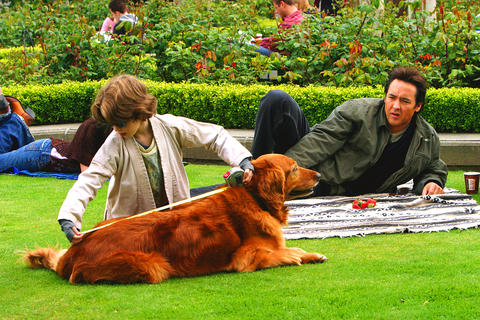Trend spotters (and actresses) take note. This season John Cusack is struggling with parenthood and worlds of sorrow: In Martian Child he plays a novelist widower hoping to adopt a small, broken boy, and in the forthcoming Grace Is Gone his working-stiff widower grapples with trying to break the bad news to his girls. In each movie the beloved is already out of the picture, which allows Cusack instantly to take possession of the screen with his trademark sensitivity. Nice guys rule, and don't you forget it.
Cusack receives fierce competition in the "aw" department in Martian Child from a golden retriever (the noble Bud) and a wee killer called Dennis (Bobby Coleman), who arrives in a cardboard box literally marked "Fragile" and "Handle With Care," and who comes equipped with trembling lips and a load of cute. But Cusack is not one to relinquish the spotlight without a fight. Like W.C. Fields he takes the challenge presented by animals and children seriously. And so he bobs, weaves, weeps, plays with the volume, kisses the girl (bashfully, naturally), stutters and smiles, tucking his chin just enough to make those dark, pooling eyes look even more inviting. Come on in, the water's just fine.
Written by Seth Bass and Jonathan Tolins from David Gerrold's short story, Martian Child is 100 percent goo. There's nothing wrong with the setup - man meets boy, surrenders heart - but there's little right about the delivery. Menno Meyjes, who last directed Cusack in Max, appears never to have met a visual cliche he didn't want to embrace, an emotion he didn't want to milk or an obvious idea he didn't want to broadcast. He lets Cusack cut loose and go lazy, while the support team (Joan Cusack, Oliver Platt, Amanda Peet) smilingly basks in the star's glow. You might think that Bobby Coleman wouldn't stand a chance, but this kid bats his lashes like Joan Fontaine. The audience wept; I just cried uncle.

PHOTO: COURTESY OF ARM

June 9 to June 15 A photo of two men riding trendy high-wheel Penny-Farthing bicycles past a Qing Dynasty gate aptly captures the essence of Taipei in 1897 — a newly colonized city on the cusp of great change. The Japanese began making significant modifications to the cityscape in 1899, tearing down Qing-era structures, widening boulevards and installing Western-style infrastructure and buildings. The photographer, Minosuke Imamura, only spent a year in Taiwan as a cartographer for the governor-general’s office, but he left behind a treasure trove of 130 images showing life at the onset of Japanese rule, spanning July 1897 to

In an interview posted online by United Daily News (UDN) on May 26, current Chinese Nationalist Party (KMT) Chairman Eric Chu (朱立倫) was asked about Taichung Mayor Lu Shiow-yen (盧秀燕) replacing him as party chair. Though not yet officially running, by the customs of Taiwan politics, Lu has been signalling she is both running for party chair and to be the party’s 2028 presidential candidate. She told an international media outlet that she was considering a run. She also gave a speech in Keelung on national priorities and foreign affairs. For details, see the May 23 edition of this column,

The Taiwan People’s Party (TPP) on May 18 held a rally in Taichung to mark the anniversary of President William Lai’s (賴清德) inauguration on May 20. The title of the rally could be loosely translated to “May 18 recall fraudulent goods” (518退貨ㄌㄨㄚˋ!). Unlike in English, where the terms are the same, “recall” (退貨) in this context refers to product recalls due to damaged, defective or fraudulent merchandise, not the political recalls (罷免) currently dominating the headlines. I attended the rally to determine if the impression was correct that the TPP under party Chairman Huang Kuo-Chang (黃國昌) had little of a

At Computex 2025, Nvidia CEO Jensen Huang (黃仁勳) urged the government to subsidize AI. “All schools in Taiwan must integrate AI into their curricula,” he declared. A few months earlier, he said, “If I were a student today, I’d immediately start using tools like ChatGPT, Gemini Pro and Grok to learn, write and accelerate my thinking.” Huang sees the AI-bullet train leaving the station. And as one of its drivers, he’s worried about youth not getting on board — bad for their careers, and bad for his workforce. As a semiconductor supply-chain powerhouse and AI hub wannabe, Taiwan is seeing